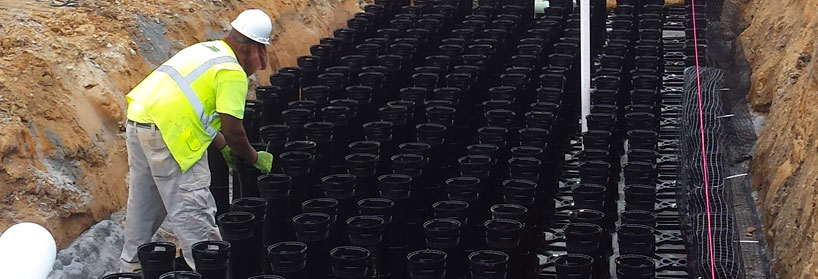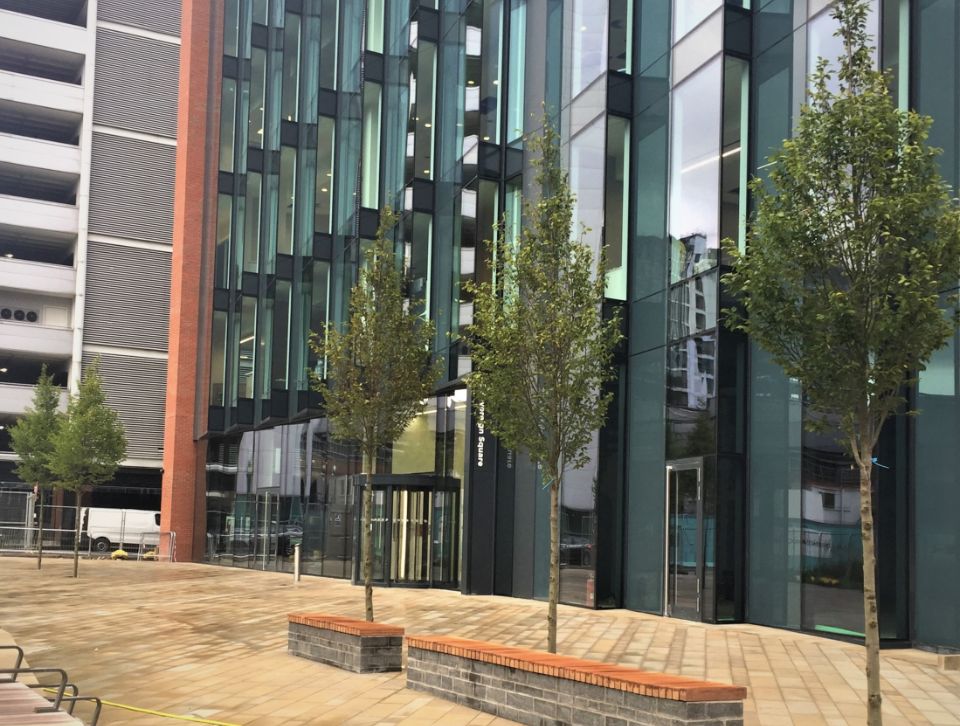
In early 2016, Fayetteville, a city in the Coastal Plain region of North Carolina, began construction on its first green street. The $1.2 million project, born out of partnership between the City of Fayetteville and North Carolina State University’s Department of Biological and Agricultural Engineering, was funded in part by a grant from the Clean Water Management Trust Fund. The goal of the project was to create a streetscape design that incorporated different types of low impact development (LID) techniques in order to manage and clean stormwater runoff.
Bill Hunt described the project to the Fayetteville Observer, saying “It’s the first extensive green street in North Carolina The project is going to be the standard bearer for the rest of the state.”
Fayetteville’s receiving stream, Blounts Creek, flows directly through town and empties into the Cape Fear River, a unique habitat for fish and other wildlife. The creek had become biologically impaired due to polluted runoff from the surrounding areas.; the intention for the city’s new green street is to improve water quality within the creek by filtering 85% of rainwater through LID features and treating it as close to the source as possible. The trees and vegetation along the street will also help improve air quality and reduce the heat island effect within the city.
The project runs along two blocks of Person Street between Cool Springs Street and Blounts Creek Bridge and occupies a major corridor to downtown Fayetteville. Here, the width of the road was reduced from its previous dimensions in order to install permeable pavers, Silva Cells, and bio-infiltration bump-outs, with the latter two features acting as raingardens. Silva Cells were included in the street design because of their ability to help meet LID volume reduction and water quality improvement goals. Traffic lanes were also reduced from five lanes on one side of the road and three lanes on the other to two lanes on each side, resulting in a 30% reduction in impervious surface area. Sidewalks were widened from seven to 10 feet and electric wires were buried, vastly improving pedestrian access and mobility.
“NCSU chose to use the Silva Cells and DeepRoot based on positive previous design, implementation, and work experience. For right-of-way applications and from a design and implementation perspective, the Silva Cell is the most flexible and integrated suspended pavement system available. NCSU, the City of Fayetteville and Clean Water Management Trust Fund were all interested in improving stormwater design methodologies for the Silva Cell and answering additional research questions,” says Jonathon Page, Extension Associate at NCSU.
Pre- and post-retrofit monitoring of both hydrology and water quality will be conducted on water samples collected along Person Street at catch basins as well as inlets and underdrains within the Silva Cell system. The project offers an educational component as the monitoring is being conducted by students within the Department of Biological and Agricultural Engineering at NCSU.
Silva Cells recently received NEST (New Stormwater Technologies) approval from the North Carolina Department of Environmental Quality Stormwater Program. As an approved product, projects in North Carolina can now incorporate the Silva Cell for use in stormwater applications without site-specific monitoring requirements and have been assigned credits for nitrogen and phosphorus removal. The NEST approval means it will be easier and simpler for innovative designers and engineers to implement green infrastructure solutions through projects like Person Street, across the state of NC.
The Person Street project exhibits how cities can comply with federal stormwater laws while also creating more pedestrian friendly and aesthetically pleasing spaces that work to strengthen a downtown core and stimulate economic activity. Project engineers hope Person Street will be a standard bearer for the rest of the state of North Carolina and beyond.
Installation Summary
Owner/Lead Design: City of Fayetteville, North Carolina
Design Support: North Carolina State University, WK Dickson
Contractor: Browe Construction Company
Length:0.3 miles (0.6 lane-miles)
Functional Class: Local
Funders/Stakeholders: Clean Water Management Trust Fund
Project Value: $1.2 million
Greenroads Version: v2
